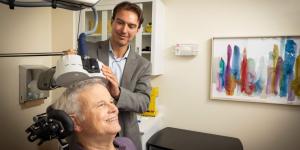Nutrition Focused Exams in Patient Care

For centuries, Italian grandmothers have been telling us that food is medicine for the soul. And more recently, clinical dietitians have started telling us that food is medicine for the body as well. To prove this, clinical dietitians are using a new tool called the Nutrition Focused Physical Exam (NFPE) which serves to develop a person’s nutritional profile, and can help clinical dietitians identify and treat harmful deficiencies.
We spoke with Hebrew Rehabilitation Center’s Clinical Dietitian Kathleen Horrigan, MDA, RD, LDN to learn more about this important new skill and how it impacts the well-being of older patients.
What is a Nutrition Focused Physical Exam (NFPE)?
An NFPE is a head-to-toe examination of a patient’s physical appearance and functional abilities, which can help a clinical dietitian uncover important clues about a patient’s nutritional needs. We are looking for physical signs and symptoms of nutrient deficiencies, some of which tend to appear well before they reflect in a blood sample.
Walk us through an NFPE. What does the process look like?
It starts with a visual examination. For patients at Hebrew Rehabilitation Center, we are generally looking at frailty, pallor, posture, body symmetry, and fluid retention. We then examine the eyes, mouth, skin, hair and fingernails, the appearance of which can reveal symptoms of specific nutrient deficiencies. For instance, thin, concave nails can be a sign of iron deficiency that can be present even without anemia.
All of our findings are taken into the context of a patient’s nutrition history. We want to know about things like home environment, recent weight changes, decrease in energy, mobility, mood, or function. It’s like adding up the pieces of a puzzle, and then we can tweak a person’s diet accordingly.
Give us an example of an NFPE success story.
We recently had a patient come into Hebrew Rehabilitation Center who reported that all of his food tasted “like nothing.” Before becoming skilled in the NFPE, I may have chalked-up his report to a general food complaint. However, with my new skill set this comment caught my attention.
I discovered that his food variety had been limited after his wife’s passing two years prior, that he had been eating poorly in the last two weeks, and that he had recently lost a lot of weight unintentionally. All of this raised concern for zinc deficiency. Working with the medical team, we tested his zinc level and found him to be severely deficient. About five days after starting a zinc supplement, voila, he started to taste his food again – great for optimizing his nutrition – but also an important part of being happy and healthy.
How has the NFPE been incorporated at Hebrew Rehabilitation Center?
The NFPE is a newly implemented tool for clinical dietitians and our discipline’s governing bodies are in the beginning stages of educating the masses. There are few published parameters yet for populations like the elderly, but as a leader in senior health care, we’ve made a real push to adopt the NFPE and specialize it our patients.
Catering the NFPE to older adults was the focus of my recent graduate work, the final application of which was a 6-hour workshop entitled “Physical Exam for Older Adults.” Our own HSL clinical nutrition staff attended and learned to use this tool for better patient care across our campuses. The workshop was approved by the Commission on Dietetic Registration for 6 hours of education credits and, in the future, we plan to expand our audience to Registered Dietitians and nutrition students in the Boston and greater Boston areas.
Since the workshop, HSL clinical dietitians and diet techs have started to incorporate the NFPE into their practice with more confidence and are making it a point to teach the NFPE to our dietetic students. In the future, we hope to partner with the Hinda and Arthur Marcus Institute for Aging Research to shed more light on how the NFPE can be used to promote better patient outcomes.
The NFPE is a non-invasive way to prevent, discover, and expedite treatment of malnutrition, nutrient deficiencies or nutrient toxicities, leading to better outcomes in supporting our patient’s overall health, happiness and well-being.
Interested in finding out more about inpatient and outpatient health care offered at Hebrew Rehabilitation Center? Call our admissions department at 877-822-4722, or learn more about admission and our health care offerings.
Blog Topics
Learn More
Long-Term Chronic Care
Hebrew Rehabilitation Center provides person-centered extended medical care in a homelike setting for patients with chronic illness. As a licensed long-term chronic care hospital, we provide higher-level, more comprehensive medical care to older adults than a traditional nursing home.

Hebrew Rehabilitation Center
Hebrew Rehabilitation Center provides skilled care and support after illness or surgery and offers long-term chronic care and specialized care for those with memory loss.




